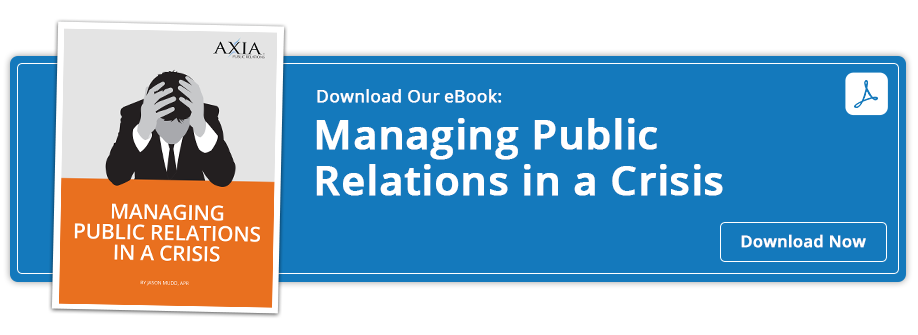Responding to a negative news story and its consequences
 Gaining news coverage for your company, yourself, or a member of your executive team is a key aspect of public relations. However, what happens when a news article is published and your company or an executive is presented in a less-than-favorable light? What is your company’s best response to the situation? Do you respond or let it be? And why?
Gaining news coverage for your company, yourself, or a member of your executive team is a key aspect of public relations. However, what happens when a news article is published and your company or an executive is presented in a less-than-favorable light? What is your company’s best response to the situation? Do you respond or let it be? And why?
Audio: Listen to this article.
Navigating this type of situation can seem daunting, especially when you and your company are handling the fallout by yourself. Your first response might be “fight” rather than “flight.” While there is some catharsis in responding, it’s often not the route to take. It's doubtful you or your company will change any readers' minds or the opinions of the outlet’s editors. Not responding to the article is like depriving oxygen to a fire – it will go out quicker. But feeding it with more oxygen will stoke that flame.
All too often, individuals or organizations continue to respond to a negative story after it's grown cold, resulting in continued negative press. You must decide to respond early and then stick to your strategy. This can be especially problematic when you have positive news to share.
Tiger Woods: An example of What Not To Do
A prime example of reigniting the news cycle is when it was first announced that Tiger Woods' marriage was in crisis. Here is a brief timeline:
- November 2009: News stories claim that Woods had an extramarital affair.
- November 27: He received a ticket for careless driving.
- November 29: With intense media speculation about the cause of the accident, Woods released a statement on his website and took sole responsibility for the accident.
- November 30: He couldn’t participate in charity golf tournaments due to his injuries; subsequently, a voicemail message (allegedly left by Woods for the woman) was released. It reignited a media storm.
- December 2: Woods issues a statement, reigniting a media storm.
- December 11: Woods releases a third statement apologizing and admitting to infidelity. It reignited another media storm.
- February 19, 2010: Woods gave a televised statement about the issues, went to therapy for 45 days, and apologized. It reignited yet another media storm.
As Woods released his first statement, US Weekly was prepping the publication of his indiscretions. Making a statement followed quickly by additional press made his apology seem insincere and fueled additional research into more stories. His continued presence, with gaps between statements, on his website and TV allowed the speculation and media storm to continue, damaging his career and sponsorships.
Our experience
A company hired us after experiencing a negative news situation. One of our first steps was checking for other news coverage by the original outlet or other media outlets and any subsequent social media posts. Two weeks after the story was published, the client finally felt enough pain and wanted to respond to the negative news. However, we showed them the story had grown cold in the two weeks following the article’s publication. There was no reason for our client to respond to the article, which saved them from reigniting the story.
You and your company can’t control everything written about you. Having positive news stories and utilizing PR (over advertising) to build a strong brand and great reputation as a company that cares is important to your success.
If you have a negative story written about you or your company, having a mentor, coach, consultant, or agency as a strategic partner can help you navigate a negative news cycle and move forward.
If you are concerned about reigniting the news cycle, schedule a consultation with PR expert Jason Mudd, APR.
 Clients love Marjorie’s work ethic, speed and diligence. She has worked with Axia Public Relations since October 2011. Marjorie graduated from Rockhurst University with a Bachelor of Arts in communication and loves to cheer for her hometown Kansas City Royals. Learn more about Marjorie.
Clients love Marjorie’s work ethic, speed and diligence. She has worked with Axia Public Relations since October 2011. Marjorie graduated from Rockhurst University with a Bachelor of Arts in communication and loves to cheer for her hometown Kansas City Royals. Learn more about Marjorie.
Topics: crisis communications



Comment on This Article